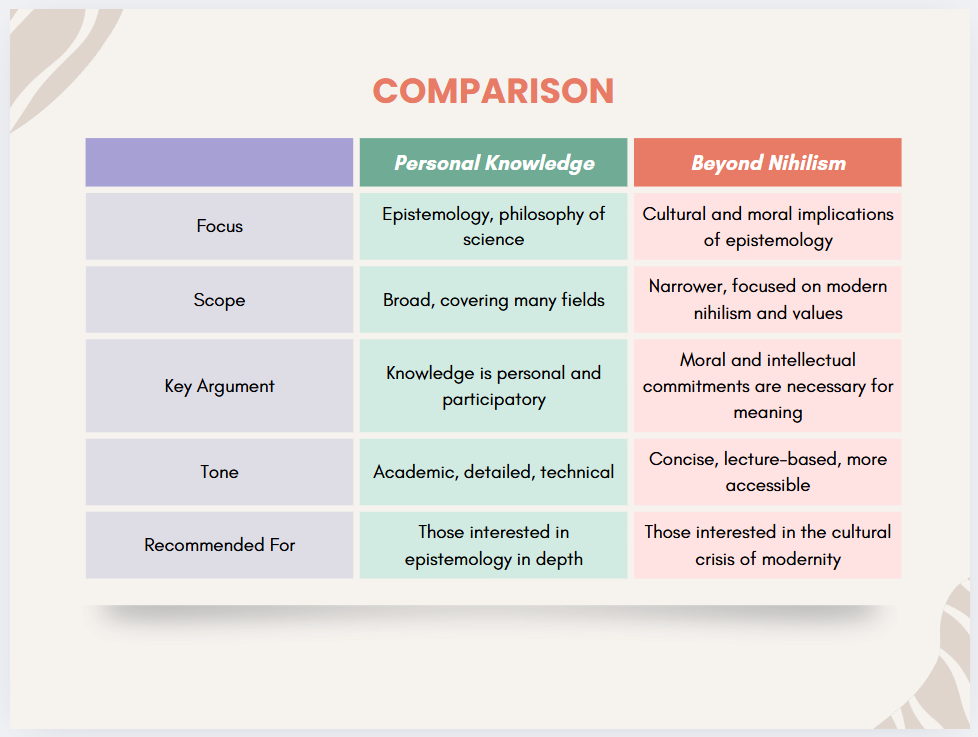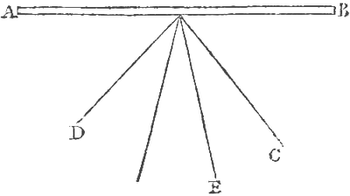Michael Polanyi’s work has had profound influence on philosophy, epistemology, and even social thought. His magnum opus, Personal Knowledge, laid out a radical rethinking of how we acquire and validate knowledge. But what about Beyond Nihilism? If you’ve already wrestled with the dense and rewarding arguments of Personal Knowledge, is it worth your time to dive into this shorter, more focused work?
The answer depends on what you’re looking for. Beyond Nihilism builds on Polanyi’s epistemological framework but shifts its emphasis to the cultural and ethical consequences of a society that has lost faith in transcendent meaning. It is a philosophical reflection on modern nihilism and the necessity of commitment in both knowledge and moral life. In this post, I’ll try to sketch out the core themes of Beyond Nihilism and help you determine whether it deserves a spot on your reading list.
In Beyond Nihilism, Polanyi takes aim at the cultural consequences of scientific objectivism. He argues that when modern thought reduces all knowledge to detached, empirical observation, it ultimately erodes faith in deeper meaning, purpose, and values. The result? A drift toward nihilism, where moral and intellectual frameworks seem arbitrary, and nothing holds intrinsic worth.
Polanyi sees this as a dangerous trajectory. He warns that a purely reductionist view of the world—one that strips knowledge of its participatory and personal dimensions—leads to a crisis in culture. We begin to see truth, beauty, and even ethics as mere social constructs, without any real foundation.
The irony, as Polanyi points out, is that even the strictest objectivists rely on implicit acts of faith—faith in logic, faith in the reliability of scientific methods, faith in human reason. But by failing to acknowledge this faith, modern thought has cut itself off from the very roots that sustain it.
One of Polanyi’s most striking arguments is that Western intellectual traditions, while advancing scientific and technological progress, have simultaneously undermined their own foundations. By insisting that knowledge must be entirely detached, impersonal, and empirical, we have eroded the structures that give knowledge meaning.
The result? Modern intellectual life has veered into skepticism and nihilism. When all values are seen as arbitrary, people struggle to find a basis for purpose, conviction, or truth. This, Polanyi argues, is not just a philosophical issue—it has profound cultural and political consequences.
If Personal Knowledge made the case that all knowing is personal knowing, Beyond Nihilism applies this insight to moral and cultural life. Polanyi insists that both science and morality require acts of faith and commitment.
For example, a scientist must trust in the coherence of reality and the reliability of their methods before they even begin their work. Similarly, moral traditions are not arbitrary constructs; they emerge from deeply embedded human commitments to certain values and ways of life. To reject all commitments in favor of radical skepticism is, in Polanyi’s view, an existential mistake.
Polanyi is deeply critical of the idea that human meaning, morality, and knowledge can be fully explained through mechanistic or evolutionary processes. While he acknowledges the importance of science, he argues that meaning cannot be reduced to mere biological survival strategies or social conditioning.
This puts him at odds with many modern materialists. Polanyi insists that true knowledge—whether scientific, moral, or artistic—is always emergent. It builds upon, but is not reducible to, lower-order physical processes. Meaning cannot be extracted from the bottom-up; it is actively integrated by human minds engaging with reality.
Unlike postmodernists who view traditions with suspicion, Polanyi sees them as crucial for sustaining knowledge and meaning. This is not a call for blind traditionalism, but rather an acknowledgment that human understanding is inherently shaped by the traditions we inherit.
For instance, scientific knowledge is passed down through apprenticeships, not just raw data. The same is true for artistic and moral knowledge—there is an embedded wisdom in traditions that cannot be dismissed as mere historical baggage. A society that discards its traditions entirely risks losing the very structures that allow it to make sense of the world.
If you’ve already read Personal Knowledge, you might wonder whether Beyond Nihilism covers truly new ground. Here’s a breakdown of how they compare:
✅ Yes, if:
You’re interested in how Polanyi’s epistemology applies to faith, meaning, and morality.
You want a shorter, more focused take on how modern culture has lost its grounding in truth.
You enjoyed Personal Knowledge and want to see its ethical and existential implications.
❌ Skip it if:
You’re looking for new epistemological insights—it doesn’t go beyond Personal Knowledge in that regard.
You’re not particularly interested in the cultural crisis of meaning or modern nihilism.
Beyond Nihilism is a powerful but compact reflection on the modern world’s struggle with meaning. While it doesn’t introduce radically new ideas beyond Personal Knowledge, it applies Polanyi’s epistemology in ways that are deeply relevant to today’s cultural debates.
If you find yourself wrestling with questions about the loss of meaning in modern life, or if you’re interested in how Polanyi connects faith and knowledge, it’s well worth your time. However, if you’re primarily interested in his epistemological arguments, Personal Knowledge remains the more essential read.
For those intrigued by the battle between reductionism and an integrated vision of knowledge, Beyond Nihilism serves as a compelling philosophical antidote to the emptiness of modern skepticism. It reminds us that knowledge is not just about facts—it is about meaning, commitment, and the ways in which we choose to engage with the world.
.png)





